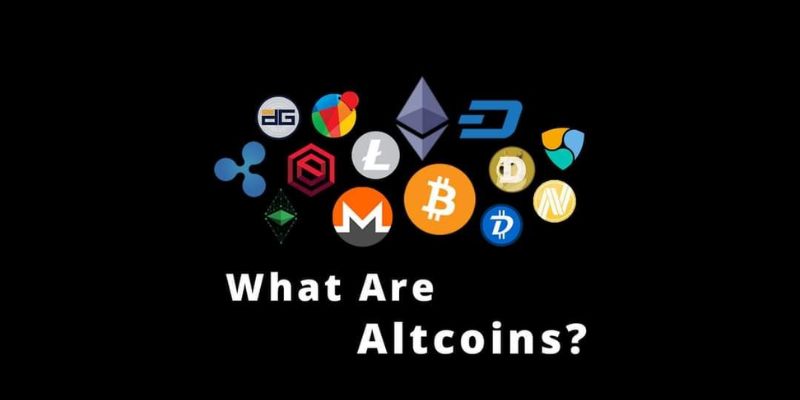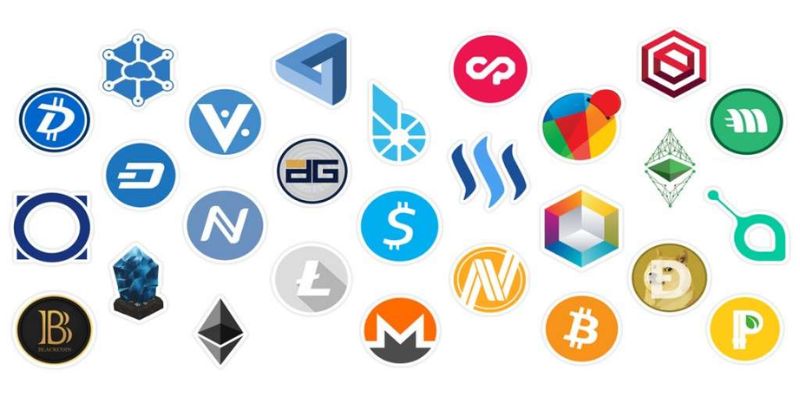Bored with Bitcoin? You’re not alone. Trust me, there’s a whole world of crypto beyond it. Peep beyond the Bitcoin bubble and What is an altcoin? springs to mind. Well, they’re the new kids on the blockchain, hungry to prove their worth. As a crypto connoisseur, I’ve seen them all rise and dip. So sit tight! I’ll be your guide through the altcoin maze. From fresh tech to solid gold tips on bagging the next big coin—get the inside track here. Prepare to make sense of these digital dynamos.
Demystifying Altcoins: A Comprehensive Guide
Altcoin Definition and Core Concepts
Let’s break down what an altcoin is. Simply put, an altcoin is any digital currency that isn’t Bitcoin. Since Bitcoin’s birth, many other cryptocurrencies have surfaced. They aim to improve on Bitcoin or offer different features using blockchain technology. Blockchain is like a digital ledger that keeps all transaction records safe and sound.
One key thing separates altcoins from Bitcoin: they try to plug Bitcoin’s gaps. Think faster transaction times or more privacy for users. Ethereum, the first altcoin, is a great example. It went live with smart contracts, which are like self-operating computer programs. They automatically run when specific conditions are met, without needing a middleman.
The Various Types of Cryptocurrencies Beyond Bitcoin
Talking about types of cryptocurrencies, it’s a full-blown buffet out there. Think beyond Bitcoin, and you’ll find hundreds of options. Each has its flavor, with unique twists to capture your interest. Ethereum, as I mentioned, is famous for its smart contracts. Litecoin is like Bitcoin’s quicker sibling, with faster transactions and lower fees. Ripple works a charm for banks, offering a speedy money transfer system.
Some altcoins are proof of work, where miners solve puzzles to add transactions to the blockchain. Others are proof of stake, where ownership of the coin gives you mining powers. Crypto market fans also buzz about privacy coins. These coins keep user details in the dark, making transactions super private.
Investing in altcoins can spice up a crypto portfolio. It’s a bit like gardening. You wouldn’t just plant one type of flower, right? So why stick to Bitcoin alone? A bouquet of altcoins can bring balance and color to your investment game. But remember, research is king. A top altcoin for one might not fit another’s strategy. Initial coin offerings (ICOs) are also popular, a bit like a public funding round for new cryptocurrencies.
The cryptocurrency market moves fast, and staying alert to trends is vital. Newcomers and established coins alike can shake things up overnight. Take DeFi, or decentralized finance, which is turning heads with no need for banks in transactions. Altcoin values, with market capitalization as a scorecard, are swayed by exchange liquidity and public interest.
Understanding altcoins doesn’t end with knowing their types or tech. It’s about getting the bigger picture. The future of altcoins hangs on how well they solve our digital dilemmas. How well can they make money move? Keep our wallets secure? Help our businesses grow?
When you decide to dive into altcoin waters, think of the risks. Not all coins are created equal, and some have sunk without a trace. But with smart strategies and a pinch of courage, these rising stars of cryptocurrency might just be the spark your portfolio needs.
Altcoins Unveiled: Crack the Code on Cryptocurrency’s Rising Stars
Examining the Altcoin Market: Investment and Value
Investing in Altcoins: Strategies and Considerations
Dive into the world of altcoins and you’ll find treasures and traps. Altcoins are all the other coins that aren’t Bitcoin. They each have unique features. Some are fast, some you can use for complex computer tasks, and some offer more privacy.
When you’re looking to invest, first eye the market carefully. Look for coins that stand out. You want coins that solve real-world problems or improve on Bitcoin’s tech. Check out Ethereum as altcoin. It lets people use smart contracts for all sorts of things, from games to safe, fair voting.
Next, explore the top altcoins on the charts. But don’t just jump in. Research their roots. Are teams behind them solid? Have they got a plan that makes sense? Don’t forget, some coins shine bright for a moment, then vanish.
Also, keep your ear to the ground for the next big thing. Initial coin offering (ICO) events can be goldmines. They let you buy into new and exciting ideas early. Still, they’re risky, so never bet the farm on one.
Remember, the cryptocurrency market never sleeps. Prices bounce around all day and night. So you need to steady your nerve and think long-term.
Lastly, never put all your coins in one basket. Mix big names with smaller, bright spark coins. This is called crypto portfolio diversification. It helps you not to lose everything if one coin crashes.
Understanding Market Capitalization and Altcoin Values
Now, let’s get a grip on market capitalization. In simple words, it shows us the value of all coins of a type added together. It’s like if you had a huge jar of cookies. Market cap tells you not just how big each cookie is but how much dough is in the whole jar.
Bitcoin is the giant in the jar. But many altcoins are more than just crumbs. Take Litecoin and Ripple. They’re like chocolate chips that make the jar tastier.
To figure out if an altcoin is big or small in the market, look at its market cap. A high market cap means a coin is a big player. It means more people are using it and trusting it. But a small market cap coin can surprise us with big jumps in value, sometimes.
Also, watch how coins rise or fall in the ranks. It shows you the trends. A coin zipping up the charts could be getting ready to make a splash.
So, now you know. Altcoins can be as colorful and varied as a pack of candies. Each one has its own flavor and some may suit your taste better than others. As long as you learn the ropes, keep your head cool, and spread your risks, you’re set to embark on a thrilling crypto ride. Just always remember: know what you’re sinking your teeth into, and never swallow more than you can chew.
Altcoin Innovations: Blockchain Technology and Use Cases
Smart Contracts and Their Role in Altcoin Utility
Let’s talk smart contracts. They’re game changers in the world of altcoins. In simple terms, smart contracts are like self-running programs that live on the blockchain. They work without pauses and don’t need a third party. Imagine you want to rent an apartment. Normally, you’d pay a deposit to a landlord and trust them to hold it. With a smart contract, you’d put that deposit in the contract. It stays there until you and the landlord follow the rules you both agreed to. If the rules are met, the deposit goes where it should. If not, it comes back to you.
Smart contracts power many altcoins. They make things automatic and more secure. Because of them, altcoins can do more than carry value; they can carry out tasks. This gives altcoins their own unique features and uses. It’s what sets Ethereum, one of the top altcoins, apart. Ethereum’s smart contracts let you create apps that can change how we do everything—from banking to voting.
Proof of Work vs Proof of Stake: Technological Shifts in Altcoins
Now, onto how altcoins stay secure and new ones are made. Two main ways exist: Proof of Work (PoW) and Proof of Stake (PoS). Bitcoin uses PoW. It’s like a massive math puzzle. People use lots of computer power to solve the puzzle. The first to solve it adds a new “block” of transactions to the blockchain and earns new bitcoins. But this needs tons of energy, which isn’t good for our planet.
Enter PoS, a newer, greener alternative. Instead of puzzles, users lock up some of their coins as a “stake”. The more you stake, the better your chance to add a new block and earn rewards. It’s like a lottery where buying more tickets—a bigger stake—gives you a better chance to win. This uses much less energy and is gaining steam across the cryptocurrency market.
Litecoin and Ripple are other top altcoins with different tech behind them. Litecoin offers faster transaction times than Bitcoin; Ripple connects banks for rapid global transfers. As for mining, altcoins vary. Some, like Litecoin, use PoW, but others are shifting to PoS to save energy and potentially offer faster, cheaper transactions.
Understanding how altcoins work can make investing in them less daunting. Technology like PoS not only helps the planet but also can make the cryptocurrency market more stable. As for smart contracts, they add incredible utility, making altcoins more than just money. They’re tools for building a decentralized future. Always remember to weigh the tech against your own investment goals and risk tolerance. Different types of cryptocurrencies offer different advantages and risks. Being informed is key to navigating this exciting but complex digital currency landscape. Happy investing, and here’s to the rising stars of cryptocurrency—altcoins leading innovation!
Navigating Altcoin Trading and Security
Choosing the Right Altcoin Exchanges and Wallets
When you start with altcoins, where you buy and store them matters a lot. Altcoin exchanges are like markets. They’re places where you can trade different types of cryptocurrencies. Think of it like a fruit stand, where each fruit is a different digital currency. Some fruits are common, like apples (Bitcoin), while others are more like rare berries (altcoins). Picking the right place to shop is key. You want a spot with lots of choices and good prices.
When choosing exchanges, look for big names with lots of users. This means they’re trusted. Popular ones have lots of types of cryptocurrencies – more than just Bitcoin or Ethereum. They let you swap different altcoins easily and give you good prices. They usually have stronger security too, so your coins are safer.
Now, imagine you’ve bought some berries – your altcoins. You need a safe place to keep them. This is where wallets come in. Wallets protect your altcoins. Not leather ones in your pocket, but digital wallets online or on your computer or phone. Some wallets hold many types of coins. Others only hold one kind. It’s smart to use a mix of these for safety and convenience.
When picking a wallet, think about how you’ll use your altcoins. Will you trade them a lot, or keep them for a while? Online wallets are good for trading because they’re quick to access. But if you plan to save, offline wallets are safer. They’re like a safe in your house. It’s harder to get to your coins, but hackers can’t either.
Remember, losing your wallet’s password, called a private key, means you lose your altcoins. Keep your key safe and backed up!
Risk Management in Altcoin Investment
Altcoins can make you money. But they come with risks, big ones. So you gotta be smart. That starts with not putting all your eggs in one basket. This means, don’t just buy one kind of altcoin. Spread your money out over different types. This helps protect you because if one coin fails, you don’t lose everything.
Next, know when to hold and when to fold. Altcoins can change value fast. Sometimes, coins go up a lot, which can be exciting. But they can crash too. Set rules for yourself. Decide how much you’re willing to lose, and stick to it. If a coin hits that limit, consider selling before it gets worse.
Stay on top of trends. Read about new coins and technology changes, like Ethereum moving from proof of work to proof of stake. This means it’s changing how transactions are checked and coins are made, for a less power-hungry process. These shifts can really shake up altcoin values.
Lastly, pay attention to rules from governments. They can be friends or foes to altcoins. Changes in laws can make prices soar or sink. Being in the know can help you act before big sways in the market.
Investing in altcoins is like a wild ride. Exciting, but unpredictable. Be smart, be safe, and you might just enjoy the rush while making some cash.
We’ve dived deep into altcoins, peeling back layers to reveal what they truly are. We started by defining altcoins and exploring the many types that exist beyond Bitcoin. We then moved to the market itself, discussing how to invest wisely and understand their value. We saw how blockchain advances make altcoins useful, like smart contracts, and compared Proof of Work versus Proof of Stake.
Knowing how to trade altcoins and manage risks can set you up for better security in this wild crypto world. Always choose exchanges and wallets carefully and never forget to manage your risks smartly when you dive into altcoin investments. My final thought? Altcoins hold vast potential and variety, but they come with challenges. Stay informed, stay cautious, and you just might find a crypto path that works for you.
Q&A :
What exactly is an altcoin?
Altcoins, short for “alternative coins,” are cryptocurrencies other than Bitcoin. They were created after the success of Bitcoin, offering alternatives with different features, uses, and technological advancements. Altcoins aim to improve upon or offer different characteristics than Bitcoin, with some focusing on enhanced privacy, lower transaction fees, or different consensus mechanisms such as proof of stake.
How do altcoins differ from Bitcoin?
Altcoins vary from Bitcoin in various aspects including their underlying algorithms, features, and overall objectives. While Bitcoin was the pioneer cryptocurrency, most altcoins aim to address perceived limitations of Bitcoin or explore new avenues like smart contracts, DAOs, and faster transaction speeds. Each altcoin operates on its own blockchain and can introduce innovative consensus mechanisms beyond Bitcoin’s proof-of-work.
Are altcoins a good investment?
Investing in altcoins can potentially offer significant returns, but it comes with high risk. The cryptocurrency market is notoriously volatile, and while some altcoins have experienced impressive gains, others have failed or proved to be scams. Thorough research and consideration of market trends, project fundamentals, and your risk tolerance are essential before investing in any altcoin.
What are some popular altcoins?
Some popular altcoins include Ethereum (ETH), which introduced smart contracts that enable decentralized applications; Ripple (XRP), which focuses on facilitating cross-border payments; Litecoin (LTC), known for its faster block generation time; and Cardano (ADA), which boasts a research-driven approach to design. Their popularity stems from unique features and strong community support.
How can I get started with altcoins?
To get started with altcoins, first educate yourself on the cryptocurrency market and the specific altcoins you’re interested in. You’ll then need to choose a reliable cryptocurrency exchange or wallet to purchase and store your altcoins. Ensure to follow best practices for security, such as using two-factor authentication and hardware wallets, and remember to only invest what you can afford to lose.





